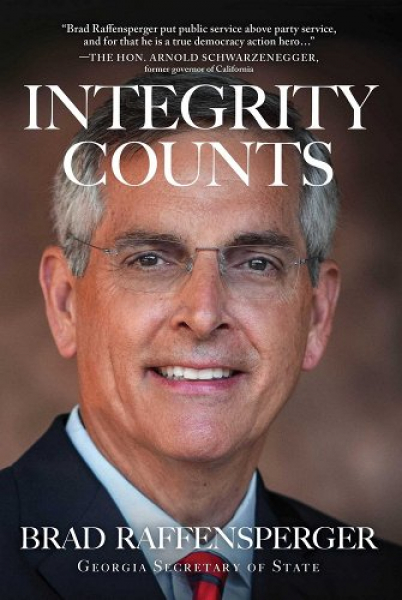The Man in the Middle of Georgia's Elections
Secretary of state races in Wisconsin, Michigan, Ohio and other states could prove pivotal to the outcome of the 2024 presidential election. Stakes have never been higher, in part due to the role played by Brad Raffensperger of Georgia in the 2020 presidential race. During an hour-long conference call on Jan. 2, 2021, President Donald Trump pressured Raffensperger into “finding him votes” despite Raffensperger’s claims that there were no errors in Georgia’s electoral count, which favored Joe Biden by a margin of 0.23%. Because the phone call occurred the same week as the two Georgia Senate elections and just a few days before the Jan. 6 Capitol riot, much of the coverage of that call got lost, even as its contents were used in Trump’s second impeachment. Now, Raffensperger looks to set the record straight in his book, “Integrity Counts.”
Raffensperger is a self-described “late bloomer” in politics. He was 55 when he first ran for office, in 2010, for a city council seat in a city of 25,000 households. Anecdotes from his early career demonstrate that Raffensperger is not the type of politician who had plotted his path to power decades earlier, or one who got into elected office because he went to the right schools or came from a prominent family. Readers should find it refreshing that someone from such humble political beginnings rose to high enough office to take a call from the president.
The first part of his book is particularly touching. Raffensperger shares his personal history and the heartbreaking account of his son Brenton, who battled drug addiction and cancer before dying of a fentanyl overdose. Raffensperger also describes how the tragedy of losing his son helped him gain faith and strength, and how it stiffened his personal resolve – a quality that would serve him well in politics. Readers should come away from this account viewing Raffensperger as someone who does what he believes is right.
The rest of the book deals with Raffensperger’s tenure as secretary of state. Before the 2020 state recount came along, Raffensperger had to deal with Stacey Abrams’s claim that Republican Brian Kemp stole the 2018 Georgia governor’s race through voter suppression and other malfeasance. Raffensperger takes Trump, Abrams, and their associates to task for what he views as baseless accusations that sowed doubts about the legitimacy of the U.S. election system. In this regard, Raffensperger’s willingness to speak out against both Republicans and Democrats makes him unique among almost all Trump critics.
Raffensperger could have mounted a stronger defense against criticism from the Right, however. He explains at length why Sidney Powell and Lin Wood were wrong, but Republicans have largely abandoned Powell and Wood – and their arguments – at this point. Others have raised more legitimate questions about the secretary of state’s handling of Democratic Party of Georgia v. Raffensperger, which was filed by Georgia Democrats after Abrams’s loss in 2018. The suit centered on how absentee ballots are verified. Under terms of the settlement struck in March 2020, a registrar who wants to challenge a voter’s signature must seek the approval of two other registrars, and two out of three registrars must agree that the signature is defective. Once a majority is reached, all three registrars must sign the ballot and explain why it was rejected. Critics claim that this process is not only impractical – when more than 1 million absentee ballots may be received in a general election – but also that the ballot-review process circumvents Georgia’s statutory requirements for signature verifications. Moreover, the settlement also requires election officials to provide notification to the person whose ballot was rejected via a phone call within three business days so that the voter can “cure” the defective ballot – but the legislature never passed this requirement, which fundamentally changed the law.
On balance, though, Raffensperger takes on his many critics and gives readers a glimpse inside his decision-making process. Regardless of whether readers agree with Raffensperger’s conclusions, “Integrity Counts” delivers a unique, personal look at an important moment in history.
Todd Carney is a lawyer and frequent contributor to RealClear Policy. He earned a juris doctorate from Harvard Law School and a bachelor’s degree from American University. The views in this piece are his alone and do not reflect the views of his employer.






